The factors that played a role in the uprising against Hasina
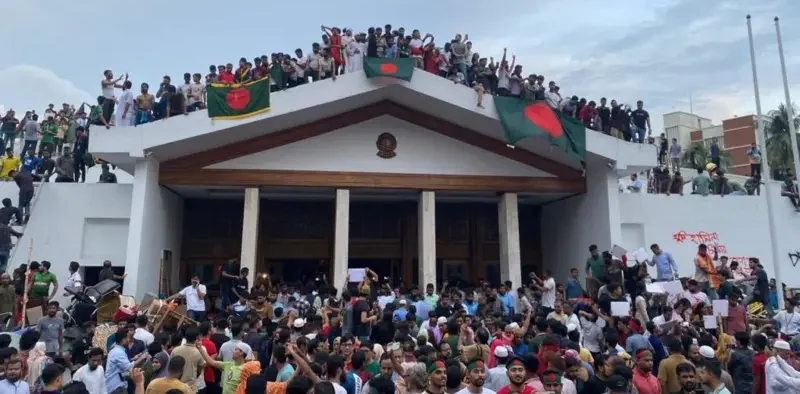
After Sheikh Hasina fled, the agitators took over the Prime Minister’s office and residence
On June 5 this year, when a bench of the High Court quashed the quota and dismissed the notification it had issued in 2018, no one had an idea that an unprecedented event would take place in the politics of Bangladesh in the next two months. Ultimately it led to the end of 15 years of continuous rule by the Sheikh Hasina government.
On that day, the order of the High Court did not get much attention in many newspapers. But at the end of the next five weeks, because of that protest, Sheikh Hasina, who had been in power for 16 years after strictly suppressing the opposition party, had to secretly flee the country.
The movement was initially centered around student quota reform. But later, lakhs of people of different age groups started participating in it.
Author Mohiuddin Ahmed describes what he calls a ‘public uprising’.
Sirajul Islam Chowdhury, emeritus professor of Dhaka University and political commentator, thinks that for a long time there was anger among people due to various reasons. People were looking for an opportunity to vent that anger.
“The quota reform movement gave them an opportunity. They have expressed their anger around that movement, their long-suppressed pain,” said Mr. Chowdhury
Many of the analysts think that the Awami League fell into the same disastrous situation after the assassination of Sheikh Mujibur Rahman and his family in 1975.
But how and why did the whole situation reach such a stage that thousands of people of Bangladesh took to the streets against the party that led the independence war?
Why Sheikh Hasina, who has been in the politics of Bangladesh for more than 40 years, had to flee the country?
Long pent-up anger
Awami League formed the government after winning two-thirds of the seats in the December 29, 2008 elections. Since then, the party did not want to come out of power.
One-sided or fraudulent elections, suppression of opposition and dissent, irregularities and corruption, dependence of the party on bureaucracy and administration are some of the main reasons behind this decline.
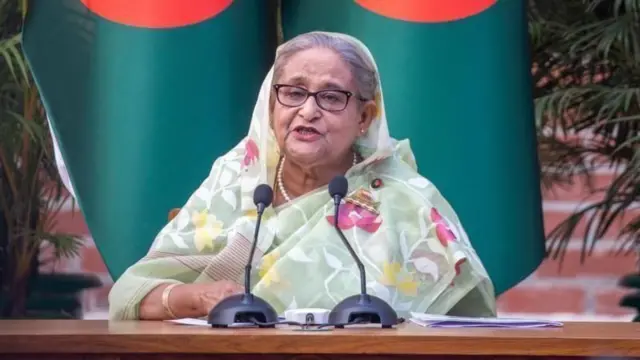
image source,Getty Images, Image caption,Sheikh Hasina resigned in the face of protests and fled to India
Executive Director of Transparency International Bangladesh. Iftekharuzzaman says, “Awami League destroyed most of the constitutional institutions in these 15 years. Even though these institutions were under the control of the government, they themselves became alienated. None of the Awami League’s power base was sustainable. Because they were totally isolated from the people.”
“So man needed a catalyst or spark.” That started with the students’ movement”, he says.
As a result, when an anti-government movement became strong, people’s anger was born around that movement, then thousands of people from different classes and professions came down the road to Ganobhaban without the permission of the army, curfew or police.
Political analyst Mohiuddin Ahmed says, “People who are angry about 15 years of pent-up anger, prices of goods, mismanagement of public transport, looting, banking irregularities have come down with the hope of a change on the occasion of the quota movement.”
Tahmina Akhter, who took part in that movement, told the BBC, “I don’t need a government job, I’m not even old enough to apply for a job. But we want an end to the lies that are being done to us, torture, and the fear that we are being kept in. That’s why I came down the road today.”
Analysts are looking at some other reasons behind the overthrow of Sheikh Hasina’s government through mass uprising.
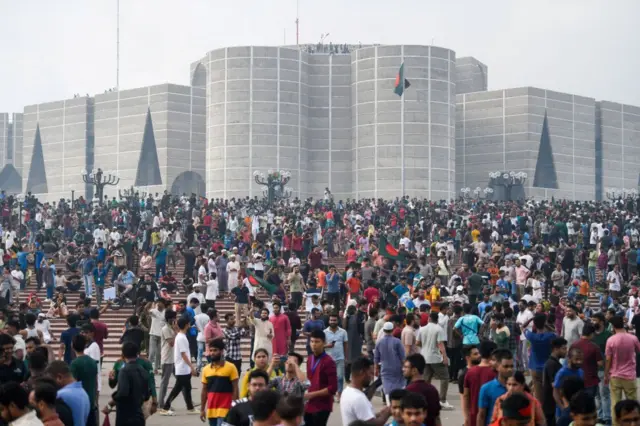
image source,Getty Images, Image caption,The president of the country has dissolved the national parliament on the demand of the protesters
Right to vote and express opinion
Despite coming to power through an election in a democratic process, the Awami League later became a de facto ‘dictatorial’ government.
After 2008, there has been no fair election in Bangladesh. Two of the three national elections held during this period have been largely one-sided elections.
Although BNP and other political parties participated in the 2018 election, there were allegations of widespread rigging and irregularities, which many described as the ‘night election’.
Awami League has spread influence even in local elections. Those elections have also been mostly one-sided. Where BNP or other political parties have participated, there have been allegations of irregularities or rigging.
As a result, in the last 15 years, people have not actually got any right to choose their representatives or express their opinion through voting.
Professor Sirajul Islam Chowdhury said, “What Awami League has done is to establish an authoritarian government by force. They did not take any judgment of the people. As a result, people’s support was not behind them. They were in power by coercing fake elections using the administration.”
Human rights organizations have complained that opposition parties were suppressed with a strong hand during the rule of Awami League.
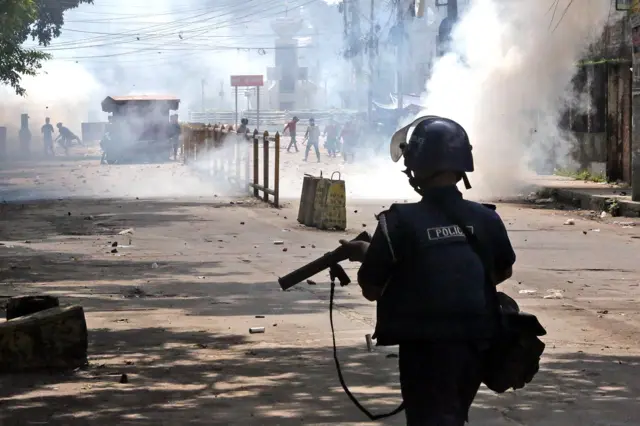
image source,Getty Images
Hundreds of activists including the central leaders of these parties have gone missing, have been detained in jails with cases or sentences. Many activists have been arrested and detained for years.
Dr. Iftekharuzzaman says, “The country which became independent against the violation of people’s right to vote, people’s right to vote has been taken away for 15 years. Added to this is freedom of speech, freedom of expression, freedom of media. “He is kept alive by various laws, by surveillance.”
In the last 15 years in Bangladesh, even in the political field, the opposition party BNP was not allowed to hold meetings without the permission of the police.
Denial of human rights and culture of fear
Human rights organizations have made many allegations of human rights violations against the Awami League government.
Earlier this year, UN human rights chief Volker Turk complained that the future of Bangladesh is at stake due to human rights issues.
Not only the political opponents, but also the opposing media and social media have been severely suppressed. Opposition media have been shut down, taken over or attempted to be controlled.
For many years in Bangladesh, there have been cases and arrests for posting statements against Sheikh Hasina or Sheikh Mujib on social media. Legislation like Digital Security Act, Cyber Security Act has been enacted to curb this.
Held in jail for months for speaking out against the government, his bail application was denied.
As Professor Sirajul Islam Chowdhury said, “They have created a culture of fear.” Intimidation of cyber security, filing of false cases – people were in a state of fear.”
Many of the analysts think that Sheikh Hasina’s government and the police forces have created a ‘mafia state’ in the entire country.
And for all these, government administration machinery, police, RAB and intelligence forces and even judiciary have been used.
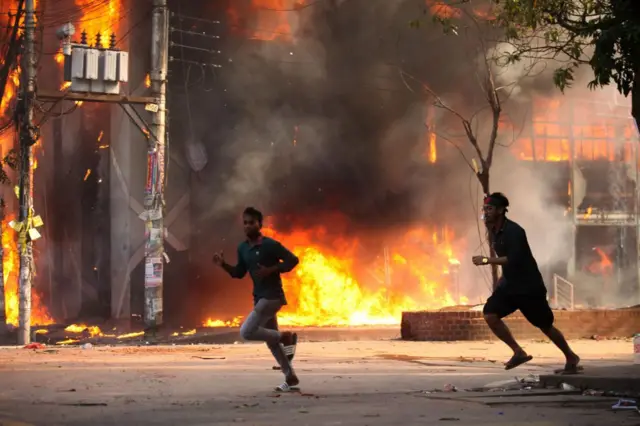
image source,Getty Images
Hundreds of workers of these political parties have been released on bail in the cases in which there was no bail in the last 16 years, after the change of government. “There’s a lot we can’t say,” the judge remarked while granting bail.
Over the years, dissidents have been captured and either disappeared or detained. After the change of government, some such persons were released, who had been held in secret without charge for more than eight years.
As a result, analysts say that people have come down in the mass movement to get rid of the suffocating situation and fear.
“Day by day, people are getting angry towards the government or Awami League. As a result, they needed an opportunity to stop,” said Dr. Iftekharuzzaman.
A party dependent on police and administration
It has also been seen in the history of different countries, the parties or political persons who are in power by force at one time become dependent on bureaucrats, administration or police. Analysts say that there is no exception in Bangladesh.
According to them, as a result of being in power for a long time, the party’s leaders and workers were separated from the people even though it was once a field political party. In particular, the party had become completely dependent on administration and bureaucracy.
The leaders who were given positions at various levels of the party, there are allegations that these positions were given in exchange of nepotism or money instead of merit.
Many people who had no previous connection with politics have been given opportunities for political office or election. Many of them have used these posts for their own interests.
Professional organizations including journalists have been partisan in such a way that these organizations have lost their original characteristics. .
Political commentator Mohiuddin Ahmed says, “Awami League used state power in the last 15 years to weaken their party. Incompetent, incompetent people are placed in the top positions of the party. As a result they had everything, but the team could not be found.”
“What their leaders and activists have done in the name of Chhatra League, Jubo League, and Awami League in every village, the people’s anger has gone to such a state, this time it has only manifested itself. When so many people have died in shootings, their fear of death by shootings has also disappeared,” he says.
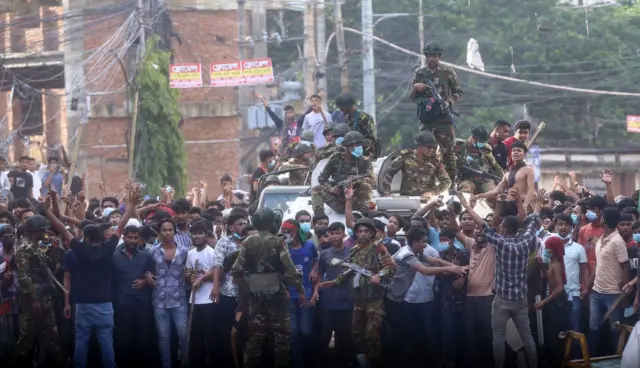
Discontent was created not only among the common people, but also among the forces on which the government depended to stay in power. As the men in their top positions used these to command the forces at will, they did not abide by laws or regulations. Similarly, many people are accused of acquiring wealth through corruption.
Professor Sirajul Islam Chowdhury says, “They created a sense of power. They thought 15 years had passed. Will be in power for another 15 years. They have not created any accountability. They thought, what they did, they did everything right.”
People who have a family history of Awami League or are close to the government, are placed in top or important positions.
Allegedly, appointments from police station OCs to commissioners have been made on the basis of political loyalty. On the other hand, many officials have been neglected due to lack of party affiliation despite their qualifications.
For these reasons, an anti-Awami League attitude was created among many in the police and military.
As claimed in a circular issued to subordinate police officers after Sheikh Hasina’s escape, ‘senior officers have been used against their will for political gain. They were forced to obey those orders.’
As writer Mohiuddin Ahmed says, “The state and the party became one. The country was ruled by one person, ruled by one family. It uses the entire state power. There were businessmen, bureaucracy, police, military all together. His power has crumbled there like a house of cards.”
‘Corruption and Begumpara’
Even though the Awami League government has announced its stance against corruption in its manifesto and leaders’ speeches, in the last three terms, allegations of corruption and money laundering have been made against most of the party’s small to central leaders and government officials.
According to Global Financial Integrity (GFI), an average of 64,000 crore rupees is laundered from Bangladesh every year. According to that, in 15 years, about 10 lakh crores of Tk have been smuggled from Bangladesh.
There have been reports of Begumpara being built in Canada with money smuggled from Bangladesh. It has been alleged that many leaders-ministers-MPs, businessmen close to the government have made second homes in different countries by smuggling money from the country, making investments.
News of many former government officials like former IGP Benazir Ahmed making wealth worth thousands of crores of rupees has been published in the media. Bribery in government offices has become a normal culture.
Many Awami League leaders-ministers have been accused of having assets worth thousands of crores of rupees abroad, taking citizenship of other countries in investment schemes.
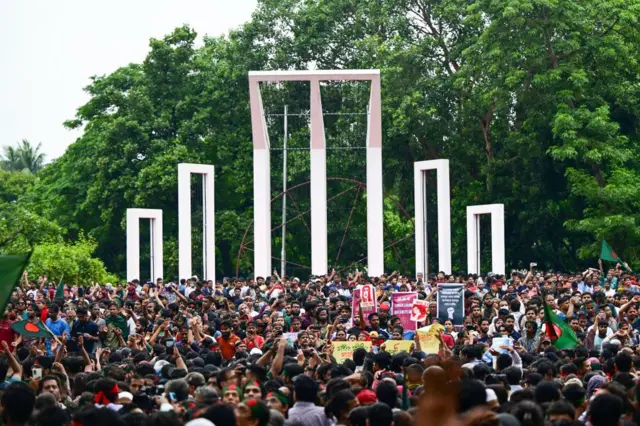
image source,Getty Images
Professor Sirajul Islam Chowdhury said, “There has been so much corruption, which people have never seen before. People’s fear and concern about corruption were raised. They have smuggled the wealth they have earned through all this. Where people are living in hardship, the information of leaders-ministers of abundant wealth abroad has upset and angered the people.
Government jobs have become so lucrative because of the scope for corruption compared to the pay that even class IV jobs have been accused of paying and accepting bribes worth lakhs of rupees.
Honorary Fellow of the Center for Policy Dialogue. Mostafizur Rahman said, “People want to get good jobs so that they can be economically secure. Earlier there were many low level jobs in the private sector, that opportunity has shrunk. As a result, they all wanted to get government jobs.
But they have faced various irregularities in the competition for that job.
The stress of ‘economic distress’
Inflation in Bangladesh has hit record highs for the past two years. As the dollar rose overnight, it had an impact on everything. The prices of all the daily necessities of people have gone up overnight.
Along with this, the shortage of reserves, the wide spread of corruption, the smuggling of large amounts of money from the country, and the irregularity of loans of thousands of crores of rupees in the banking sector have been published one after another in the media of the country.
But the life of ordinary people has become difficult day by day. As a result, anti-government attitudes have developed among them day by day.
Awami League has implemented many expensive development activities like Padma Bridge, Metro Rail, Tunnel, Payra Port, Payra Bridge, Rail Link during three consecutive terms. It also brought economic changes in many places like South Bengal. But at the same time the cost of living has also increased.
Although Sheikh Hasina and her ministers repeatedly praised these developments, the common people did not see much of their reflection in their family or personal lives. As a result, they also wanted a change.
Professor Sirajul Islam Chowdhury says, “The condition of the economy had deteriorated. They showed improvement. But it did not change the life of ordinary people. This development was hollow development. Because there was no employment. The distribution of the results of the development was also not proper. Few people have reaped the benefits.”
Along with this, leaders, government officials getting extra privileges, corruption-bribery, small businessmen-hawkers, every person who goes to get services has been forced to pay bribes.
There have been allegations of widespread irregularities using political contacts in the banking sector. On the other hand, thousands of people have lost their lives by investing in the stock market. Allegations have been made against people close to the government.
But no action was taken against them, no one was held accountable. Analysts think that people’s anger has accumulated in all these things.
Dr. Iftekharuzzaman says, “The burden of this has fallen on the common people, whose cost of goods has increased, the cost of living has increased. Their purchasing power has decreased, living has become difficult. But there was no government action to remove them.
“People were outraged by that too. They have blamed the Prime Minister Sheikh Hasina for all these things.
Sirajul Islam Chowdhury thinks that apart from these, many people did not like the government’s overdependence on India.
Because the agreements signed by Bangladesh with India in the last few years, there is criticism that they are more favorable for India than Bangladesh.
“Their reliance on India, the deals they have made, have been seen to go in India’s favour. Debt is increasing. People have become angry for various reasons,” says Mr. Chowdhury
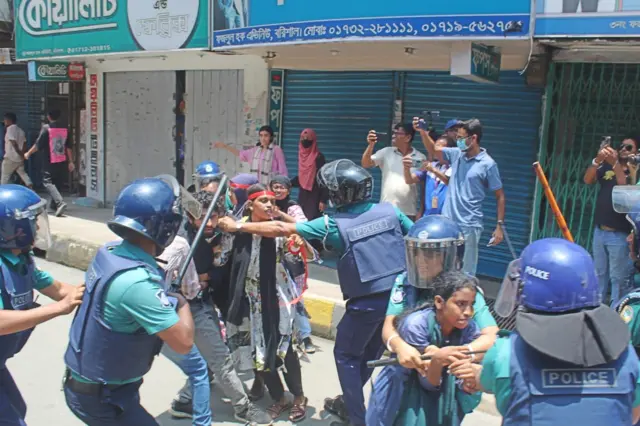
image source,Khan Moniruzzaman
Hasina did not understand the reality
Many have wondered why the government resorted to force like shootings and arrests in a movement that started demanding quota reforms in government jobs.
Former Prime Minister Sheikh Hasina’s freedom fighters’ grandchildren will not get? So will Razakar’s grandchildren get jobs?’ In response to the comments, when students came down the road at midnight chanting ‘tumi ke, ami ke- Razakar Razakar’, Awami League general secretary Obaidul Quader said the BCL would respond to their slogans.
It was clear that Awami League showed no interest or flexibility in discussing this movement from the beginning. Rather, like all the previous movements, it has been tried to be suppressed with a strong hand.
First, they tried to use their own student forces against the common students, and failed to suppress the movement with police, RAB and BGB members.
Reckless law enforcement action, firing has killed more than five hundred people in five weeks, injured thousands. Internet shutdown, curfew imposed, general holiday has to be announced to deal with the situation.
Then, when the situation seemed to be somewhat under control, hundreds of cases were filed and students were arrested and jailed in nighttime block raids.
Even after there is a video of the police firing in Rangpur’s Abu Saeed death incident, the police have put the blame on the students, trying to frame an innocent student.
Six coordinators were picked up from hospitals and homes and detained in the intelligence office for days without any reason, intimidated and forced to make statements. But no one had to answer for that.
Awami League ministers and leaders have continued to give false statements, try to mislead, threaten the agitators even after there are pictures and videos of police, BGB and party gunmen shooting.
Government ministers even said that ‘terrorists dressed as policemen opened fire’. There is a lot of misinformation about shutting down the internet.
Analysts think that these things have created anger in people, made them angry.
Dr. Iftekharuzzaman says, “There was blind faith in the kind of speech presented by the leaders from the top level. As a result, they did not give importance to the movement. They have not learned any lesson from history either.”
“As they have suppressed all the previous movements, they have tried to do the same this time. But as the students continued to protest, public support came. Misuse of power and use of force to suppress the movement has created resentment among the people. As a result, they spontaneously took part against it,” he said.
Awami League leaders and ministers have always denied the reality by claiming that there is a ‘Jamaat camp’ behind the movement. Even because of this they hastily declared Jamaat-e-Islami banned. Apart from this, complaints have been made many times that there is fuel from domestic and foreign circles.
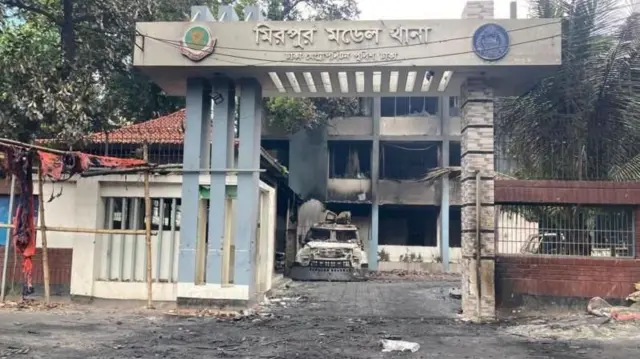
image source,BBC/Rocky
Analysts think that, on the one hand, as the government has sought fuel for the opposition, their opponents have also played a role behind the scenes in the movement. As a result, the movement gained momentum, and violence spread across the country.
Later, the government talked about talks, but by then it was too late. By then it had gone beyond a quota reform movement to a movement of public anger.
Sheikh Hasina’s son and her former information technology advisor Sajib Wazed Joy also said in an interview to BBC that no one could have imagined that the quota movement would lead to the overthrow of the government.
Analysts say that as the top leadership of Awami League did not take into account the demands of the students in the beginning, they did not understand the fact that later the demands of the common people were mixed with these demands and they also became a part of it.
Analysts believe that the indiscretion, wrong decisions and comments of the top leadership of the Awami League government are the most responsible for making the whole situation confusing.
Analysts are complaining that various organizations of the Awami League genre, media and intelligence agencies have supported the unreasonable and imprudent decisions of the government.
“The people of Awami and various organizations have created the Frankenstein by supporting the government day after day in various unreasonable and unfair activities, that Frankenstein has caused destruction for everyone,” said Dr. Iftekharuzzaman.
BBC










